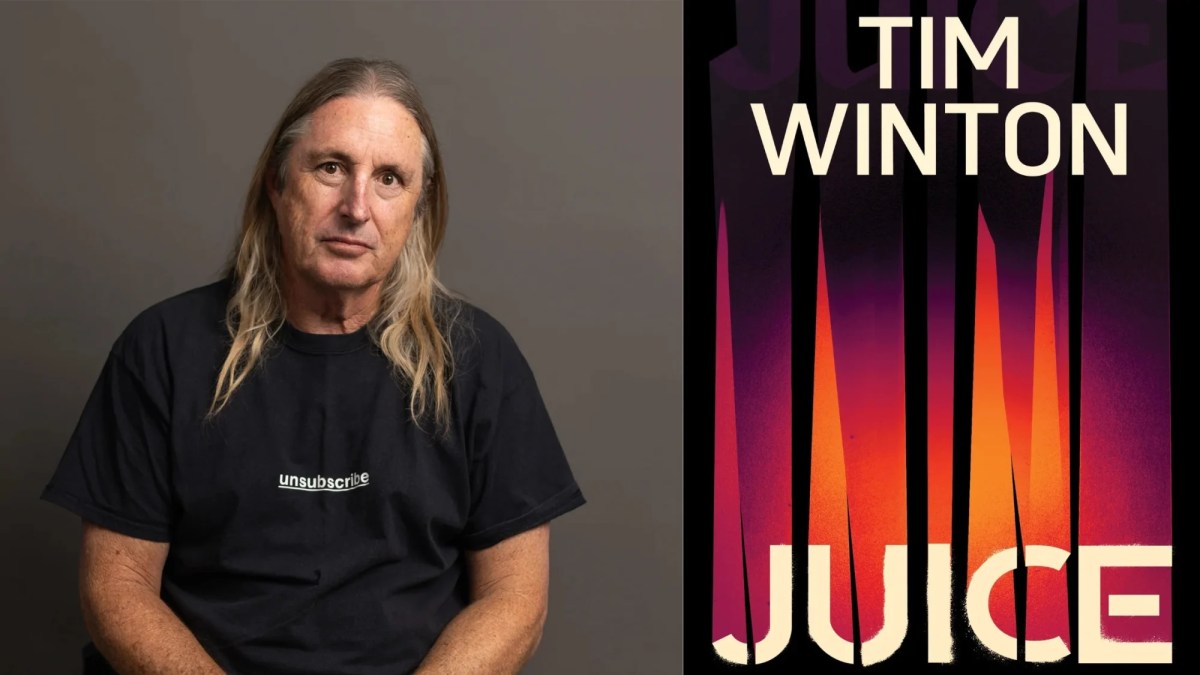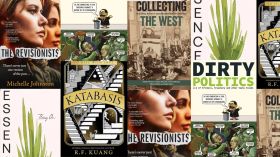You usually know where you are with a Tim Winton book. Since his Vogel Award-winning 1982 debut An Open Swimmer, his novels have been characterised by the beach, surfing, mateship, families and hope, and Winton has evolved into one of Australia’s most significant writers. He is beloved by both book clubs and the Booker Prize (with two shortlistings), having written over 30 books that have been turned into film and stage productions. So why would he depart from his successful formula to write a dystopian cli-fi novel like Juice?
In his first novel in six years, Winton, as a long-standing environmental campaigner, has set Juice in a future that extends the current climate crisis. His narrator is a toughened survivor on the road with an unspeaking girl, passing failed settlements and the wreckage of human civilisation. They find themselves on the wrong end of a crossbow as they are captured and the narrator recounts his story to win over the bowman.
Read: Book Review: Deep Water, James Bradley
Over the course of the storytelling night we learn that the narrator has gone from end-of-the-world farmer to an ‘operator’ in the Service, a secret organisation that has progressively ‘acquitted’ the last of those responsible for the natural world’s destruction, mostly oil companies and their lackeys. The work has come at a heavy cost with our protagonist drawn into dubious missions with murderous methods, all while living a double life back at the homestead, keeping the truth from his mother, his wife Sun and their daughter. We are a long way from Cloudstreet.
In the stripped back prose, one of the stylistic choices Winton makes is to never name his central characters. Our narrator’s induction into the Service saw him swearing to anonymity and he preserves this even as he tells the story. It’s a mark of Winton’s experience that, even without a name, the narrator is a fully fleshed out character holding the reader’s sympathy throughout his story. While the bowman is a cynical interruptor with his finger on the trigger, the narrator has that most Winton-esque hope that somehow they can work together and survive.
This conflict of collective hope against the easy route of individual survival is the guts of Juice, an entrancing struggle that makes for a pacy read. Like an artful thriller writer Winton introduces plot twists to keep the book moving while trying to understand the future landscape. Like any speculative fiction, there’s a lot of world building. Winton blurs the passing of eras –there is the Terror when the world fell apart and the Long Peace when it seemed that the Service may have won.
Winton delights in the secrecy of the Service, their euphemistic language as their ‘acquittals’ are disguised assassinations of whole families. The world is dimly recognisable with Perth a shattered city and Sydney protected by a wall, but it is the natural world where Winton documents the damage. There is a sketchbook of extinct animals that the narrator carries, a climate that pushes people to live underground for the stretching summer and a globe that is still warming so subtly that our narrator neglects to acknowledge the warning signs.
It is hard to predict if Winton’s fans will follow him into this new ground or if speculative fiction readers will be convinced he can create a cli-fi narrative. There’s plenty to reward both with a potent vision of the future that points a finger at the complacency of the present. It never feels too earnest or preachy because it is presented so plainly. Other Australian authors have taken on cli-fi – notably James Bradley, Jane Rawson and Claire G Coleman, who all create fascinating worlds impacted by the climate emergency – but Winton’s move into a new genre has revitalised his writing. Juice will not sit easily beside Winton’s other novels; it is tense, dark and demands to be heard.
Juice, Tim Winton
Publisher: Hamish Hamilton (Penguin)
ISBN: 9781761344893
Format: Hardback
Pages: 528 pp
Release date: 1 October 2024
RRP: $49.99






